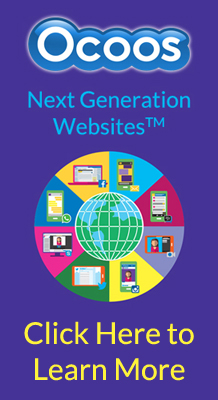Ocoos Review published by Hotel Business Review Hospitable by Nature and Intelligent by Design: Technology Solutions for Hotel Executives
Hotel Business Review (HBR) published a review article about how Ocoos can help hotel executives. You can find the full Ocoos Review here. Below we quote the full article:
Hotel executives face a challenge and an opportunity, both of which have their roots in the disruptive power of technology.
At one extreme, there are the makeshift, room-for-rent social entrepreneurs - the men and women who offer overnight accommodations (courtesy of a spare bed, couch, futon or floor) to travelers in a major city - while at the other end of the spectrum there are conventional hotels and resorts.
The latter, despite their more spacious and inviting arrangements, including housekeeping, room service, plush decorations, magnificent views and in-room entertainment; among these conventional hoteliers and high-end, five-star brands, there is a keen need to more effectively reach potential guests and adapt to this hyper-competitive environment.
The only way to achieve that goal and increase occupancy rates, without succumbing to downward pressure from less traditional players in this space, centers on two concepts: Design and data.
That is, hotel executives must invest in creating websites that capture the respective identities of the companies they represent - these sites must be as distinctive as the properties they depict, and as distinguished as the people they celebrate - so they can enhance the loyalty of existing patrons and win the attention of prospective travelers.
All the while, the principles of design must complement the power of data; the information hotel executives can readily access and analyze, to determine (and refine) the efficacy of a particular marketing campaign and customize appeals on behalf of specific individuals to developing new leads and consolidating control of certain industries.
These facts are, however, part of a much larger call to action; they are also a reminder that the era of "cut and paste" websites, the reliance on mere templates (with a limited choice of colors and options, to enclose the same corporate boilerplate and boring verbiage), is over.
This chapter may be at its end, but that does not mean some hotels will not continue to rely on the sort of generic tools and resources that yield ever-diminishing returns. Which is to say, if you are a hotel executive, and your property is "digitally invisible," so to speak; in other words, if your site fails to make a lasting impression with viewers - if it does not even register on the proverbial radar screen (or mobile device) of business or leisure travelers - then it is time to change this situation for the better.
I write these words from experience, where, in my role as Founder of Ocoos, I give executives the freedom to build their own websites, manage real-time traffic, and examine the analytics concerning their online sales and marketing.
Among the quartet of services referenced above, having an original website that reflects the values and culture of a company goes well beyond aesthetics and an eye for good design. For that site is a hotel executive's best defense against online aggregators that charge large fees and decrease profit margins. It is, thanks to Google search (which is free) and a combination of excellent copywriting and relevant keywords, every hotelier's chance to embrace storytelling as the ultimate form of branding.
That point, which I will return to in a moment, further underscores the urgency for hotel executives to choose character over conformity; to accelerate content marketing, improve regional sales, forge local partnerships and streamline business operations.
And yet, even the most gifted wordsmith or the most inventive marketing officer cannot tell a story - there is no way to encapsulate the legacy of a famed hotel or secluded resort - within the inflexible parameters of a small square, patronizingly labeled "Insert Text Here."
Having the liberty to craft a site befitting a hotel's reputation, and having the ability to do that through an integrated platform that is safe, affordable and easy to use, signifies a genuine revolution in the history of the Web. (These features also have a concierge component, where an executive can have professionals run the day-to-day tasks of any online initiative.)
This advantage, where a hotel executive can transcend the conventional (which is, increasingly, another word for confinement), is not only a license to communicate well, to express the allure and describe the amenities of a particular property; it is an invitation to showcase that property in all its glory, from its manicured grounds and majestic trees and greenery to its sleek spa and aquamarine swimming pool.
It is, additionally, a means of leveraging the influence of that one-word hymn of both real estate professionals and hotel executives: Location.
It is a way to better convey a hotel's closeness to nearby attractions, museums, monuments, civic centers, events and theme parks.
It is, in the shorthand of the Web, the best way to offer incentives like extended stay pricing, group packages, local rates, deals, discounts and themed getaways for couples and families.
If these things are a summary of the benefits of creating - and sustaining - a positive online identity, if this material convinces you, the reader (who also happens to be a hotel executive), that a website is more than a series of tabs, links, images and the sequential display of some business slides, then you "get it"; you respect your brand enough to know - or rather, you need not be told - the obvious: That a customized website elevates your hotel's reputation as much as a generic one undermines almost everything else you do.
A website is what current and prospective guests see; the data behind this exterior is what you, as a hotel executive, must see. Put another way, the analytics of a site - the real-time intelligence about individual visitors, which can be translated into actionable and thoroughly personalized messaging - is the language of the Internet.
Parsing that data, by being fluent in this language of so many ones and zeroes, is the now-formerly exclusive domain of large corporations with vast marketing budgets.
This union of design and data, the necessity of the first and the democratization of the second, is the greatest technological milestone for the hospitality industry in many, many decades.
I offer this report without exaggeration or bias, though I am a champion of hoteliers (albeit a pragmatic one), because, even if my assertion has the slightest sound of excess enthusiasm, history is irrefutable. And the historical record shows that, minus the automation of those customary business functions common to most industries, never has so much information been available to so many . . . for such an affordable price.
But the overriding question remains, "What can data reveal to the ambitious hotel executive?" In a word: Everything!
Hoteliers can use data to target specific groups, with specific messages and incentives, while freeing themselves of the crippling forces of doubt and uncertainty. For these twin agents are almost always present because, in the absence of verifiable, scientific information (as opposed to sophistry-by-calculator), an executive will not know - it is impossible to know - what a potential guest wants.
To know "the language the Internet talks" is to know how to communicate, visually and verbally.
We should not expect hoteliers to master this language, nor should they try to do so.
We should, however, expect them to have the resources to enable others to speak this language with sophistication and wisdom.
And, as a sort of addendum to the following question, "Who wins from this combination of design and data?" my response is as all-inclusive as my earlier reply to a similar query: Everyone!
We are no longer players in a zero-sum game for domination of the hospitality industry. We are, instead, participants in a quest to dominate our own respective brands; to better and more consistently reach our intended guests, with the art of superb design and the currency of valuable data.
With access to these tools and the availability of so much talent, hoteliers should rejoice. They should recognize this occasion for what it is: A chance to remove conjecture from the decision-making process, to be free of the futile attempt to divine intentions and decipher cryptic responses from business and leisure travelers.
It is that opportunity that can end the costly exercise of having hotel executives intuit feelings rather than interpret facts.
This shift is an everlasting transition from an inglorious past to a much more promising present. With an eye toward an exciting tomorrow, the hospitality industry can inspire other businesses to seize the same advantages for the same outcomes.
The future looks bright, indeed.



